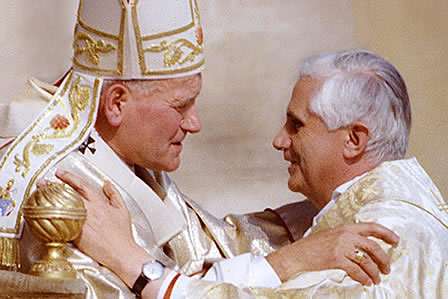
Saint Robert Bellarmine, S.J. (Italian: Roberto Francesco Romolo Bellarmino; 4 October 1542 – 17 September 1621) was an Italian Jesuit and a Cardinal of the Catholic Church. He was one of the most important figures in the Counter-Reformation. He was canonized in 1930 and named a Doctor of the Church.
EWTN has a regular series called Saints Alivein which Saint Bellarmine was one of the featured saints.I found this episode to be especially interesting because they took the position that he had some influence on our (United States)founding documents.From there I also found an article that made the same assertion. Here I'll quote the article and you will see why they also reached the same conclusion: POLITICAL AUTHORITY:Bellarmine's position that political authority is vested in the people and that kings do not rule by divine right, but through the consent of the governed. This was a radical idea in the early 1600's, though it is widely accepted today. PATRIARCHA by Robert Filmer Quotes Bellarmine: In Patriarcha, Filmer quotes Bellarmine directly as follows: "Secular or Civil authority (saith he) 'is instituted by men; it is in the people unless they bestow it on a Prince. This Power is immediately in the Multitude, as in the subject of it; for this Power is in the Divine Law, but the Divine Law hath given this power to no particular man. If the Positive Law be taken away, there is left no Reason amongst the Multitude (who are Equal) one rather than another should bear the Rule over the Rest. Power is given to the multitude to one man, or to more, by the same Law of Nature; for the Commonwealth cannot exercise this Power, therefore it is bound to bestow it upon some One man or some Few. It depends upon the Consent of the multitude to ordain over themselves a King or other Magistrates, and if there be a lawful cause, the multitude may change the Kingdom into an Aristocracy or Democracy' (St. Robert Bellarmine, Book 3 De Laicis, Chapter 4). Thus far Bellarmine; in which passages are comprised the strength of all that I have read or heard produced for the Natural Liberty of the Subject." (Patriarcha, page 5.) THE 3 FORMS OF GOVERNMENT:
Bellarmine's voluminous political writings reveal his belief that each of the three forms of government — monarchy, aristocracy and democracy — have their unique advantages and disadvantages, but he insists that whatever "combination" is adopted by a people should be nothing less than the one that is "most useful" to them.DEMOCRACY: Bellarmine saw in Democracy a potentially good form of government, but warned that a simple or pure approach to it would lead to mob-ocracy. He frequently quoted Plato, who said, "Who can be happy, living under the arbitrary will of a crowd?" BELLARMINE & THE DIVINE RIGHT OF KINGS:
During an age in which the descendents of Henry VIII and their Protestant apologists were expounding the Divine Right of Kings, Bellarmine was defending a form of government that finds good qualities in monarchy, aristocracy, and democracy, and insists it is the right of the people to decide the "combination" under which they are to be ruled.AUTHORITY FROM GOD AND THE CONSENT OF THE GOVERNED:
Bellarmine agreed that all power came from God, but saw each nation as a political unit composed of individual souls each by their nature free and equal creations of God. Being free and equal, none had any more or less right to rule than another, but because survival depends on some kind of orderly and good government, the necessity for some kind of civil authority was inherent in the nature of society. As it was divinely inspired that men and women should form communities, and thus need government, it stands to reason that the members of that society should determine who rules them as individuals. Political authority may come from God, but who exercises it is the will of the people.Source: http://www.catholicculture.org/culture/library/view.cfm?id=6607



No comments:
Post a Comment